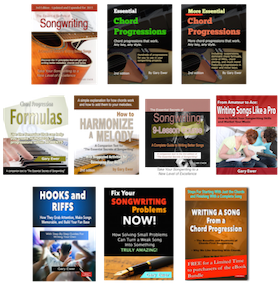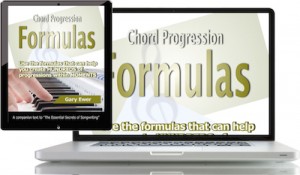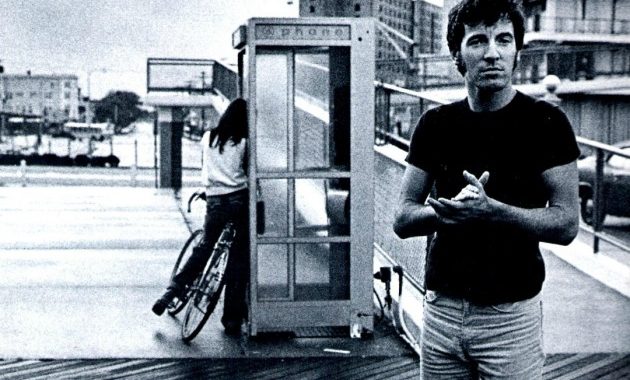The purpose of a payoff line is to provide a point of focus for your lyric, and, by extension, a purpose for your song. It’s a kind of hook that is delivered by the lyric. When a listener hears a good payoff line, their subconscious reaction is, so that’s what the song’s really about. (Example: “Bridge Over Troubled Water”)
While song lyrics can all be open to interpretation, you’ll find that a payoff line provides a sense of clarity. That’s not to say that payoff lines will reveal everything to you; there could still be an aspect of private interpretation, but as far as you’re concerned, you’ve just experienced the whole point of the song when you hear the payoff line.
 Get the eBook Bundle package that’s being used by thousands of songwriters to polish their songwriting craft. “The Essential Secrets of Songwriting” 10-eBook Bundle covers every aspect of good songwriting, and comes with a free copy of “Creative Chord Progressions”
Get the eBook Bundle package that’s being used by thousands of songwriters to polish their songwriting craft. “The Essential Secrets of Songwriting” 10-eBook Bundle covers every aspect of good songwriting, and comes with a free copy of “Creative Chord Progressions”
To make it clear what we’re talking about when we talk about payoff lines, here are some important characteristics:
- It often happens at the end of a verse or chorus. Examples: “I Walk the Line” (Johnny Cash), “Save the Best For Last” (Phil Galdston, Wendy Waldman, Jon Lind, recorded by Vanessa Williams).
- It can start the chorus, be repeated throughout the chorus, end the chorus, and in that sense, act as an important point of focus for the entire chorus. Example: “You Are Not Alone” (Robert Kelly, recorded by Michael Jackson).
- It often incorporates a lyrical cliché (not a bad thing). (Examples: “Hungry Heart” (Bruce Springsteen), “Stronger” (What Doesn’t Kill You)” (Jörgen Elofsson, David Gamson, Greg Kurstin, Ali Tamposi, recorded by Kelly Clarkson).
Some things to think about as you consider payoff lines:
- Because they are such an important point of focus, you might start your lyric-writing process by creating the payoff line first, and then work away from it. In that sense, you’re saying, “This line is the point of the song. Now, how do I get to it? What do I do once I’ve written it? How do I make this line stand up and get noticed?“
- Payoff lines will frequently become the title of the song, so it makes sense to spend some time writing down catchy words and phrases as a starting point, phrases that might eventually become the payoff line. Write a line or phrase that you like (“Speak softly“), then consider it to be the end of a chorus lyric. From that one phrase, make decisions about what the song is about, and how that phrase makes sense as the end of a series of thoughts. Also, think about what might follow a phrase like that: “Speak softly, ’cause I hear too much/Speak softly, I only want your touch…”) As you write, you get a stronger sense of what your song is about, and you can refocus and hone what you’re writing.
- A payoff line only works if the lyrics surrounding it point to that line as being ultimately important. A line can be catchy, but won’t work well as a payoff line if it comes out of nowhere, with nothing supporting it.
- Not every song lyric needs a powerful payoff line. There is much that makes a good lyric. If you think of it as a kind of “reveal”, you’ll know that not every song needs that kind of feature.
- A good payoff line has the attributes of a good song hook. And in fact, hooks and payoff lines often go hand-in-hand.
When all is said and done, a payoff is simply one way to achieve what every song needs: a point of focus. As I say, not every song needs them, or else instrumentals wouldn’t work.
But for a good lyric that is memorable and catchy, one that can easily be brought to mind by a listener, a payoff line provides the kind of structure what can get the job done.
 Written by Gary Ewer. Follow Gary on Twitter
Written by Gary Ewer. Follow Gary on Twitter
 “The Essential Secrets of Songwriting” 10-eBook Bundle includes several ebooks dedicated to getting your chord progressions to work even better, including the very useful “Chord Progression Formulas”, which can help you create progressions in moments.
“The Essential Secrets of Songwriting” 10-eBook Bundle includes several ebooks dedicated to getting your chord progressions to work even better, including the very useful “Chord Progression Formulas”, which can help you create progressions in moments.










